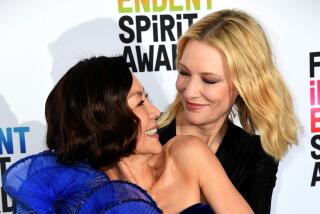Review: In a dazzling restoration, ‘Howards End’ reemerges as a mannered masterpiece
“Howards End” endures.
Re-released in a sparkling new 4K restoration that dazzled audiences at its Cannes debut, this landmark example of a movie of passion, taste and sensitivity that honestly touches every emotion has not only not dated, it is as moving and relevant as it was the day of its 1992 release.
A major success at the time, “Howards End” received nine Oscar nominations, including best picture, director, cinematographer and acting nominations for Vanessa Redgrave and Emma Thompson, who won along with Ruth Prawer Jhabvala’s script and Luciana Arrighi and Ian Whittaker’s art direction and set decoration.
Experience was essential in bringing E.M. Forster’s 1910 novel of families in love and in conflict to the screen, and producer Ismail Merchant, director James Ivory and screenwriter Prawer Jhabvala had collaborated with each other for 30 years on films like “Heat and Dust” and “A Room With a View” when they undertook this project.
What sets “Howards End” apart is the complex emotional life of its characters. This is a film capable of setting off lasting and heartfelt reverberations below an admittedly exquisite surface: As its Cannes screening demonstrated, every time you see it, it moves you in different ways.
After having created a number of films in Edwardian dress, the Merchant-Ivory team knew how to be more than literally faithful to the look of those times, they knew how to make that world seem genuinely inhabited, and the level of authenticity created is the more convincing because it seems to be so casually done.
Having a novelist as psychologically acute as E.M. Forster to work off of certainly gave a leg up to all concerned. In addition to his facility with character and relationships, Forster in “Howards End’’ was dealing with a powerful theme, the pangs of a society in terrible flux. There was a serpent loose in the genteel garden that was Edwardian England, the serpent of the modern world, fated to bite everyone and change everything. The only question was, how much?
Like the novel it follows, “Howards End”’ begins not head on but from an angle, with a peripheral but telling relationship. Helen Schlegel (Helena Bonham Carter) is visiting with the Wilcoxes, a family that she and her sister Margaret (Emma Thompson) met the previous spring, at Howards End, the Wilcox’s romantic old pile of an English country home.
Certainly, the Schlegels and the Wilcoxes would seem to have very little in common. The three Schlegel siblings (Helen and Margaret have a rather ineffectual younger brother named Tibby) are cultured people with a lively interest in London’s intellectual scene. The Wilcoxes, by contrast, are typified by father Henry (Anthony Hopkins), the essence of triumphant capitalism, the wealthy head of the Imperial and West Africa Rubber Co. who is abrupt, distant and often unfeeling.
But when the Wilcoxes come to London for a stay and take a flat practically next door to the Schlegels, Henry’s wife, Ruth (Vanessa Redgrave), and Margaret renew their acquaintanceship. Very different from her children and her in-laws, Ruth is passionate about the old ways, in love with English tradition in general and with the property at Howards End, which belongs to her, not her husband, in particular. Though she would not seem to have much in common with the chatty, terribly up-to-date Margaret — she doesn’t even believe in giving women the vote — the two find an unspoken emotional kinship growing between them.
At the same time, the impulsive and high-strung Helen takes an umbrella by mistake (a habit of hers) and makes the inadvertent acquaintance of one Leonard Bast (Sam West). A low-paid clerk at an insurance company, Bast’s situation is economically precarious, and that has made him touchy and easily offended. Possessed of a terribly earnest poetic soul, he is dazzled by the Schlegels’ easy, spirited ways and by the cultured, idealistic world they so effortlessly inhabit.
Because it is confident of its story and its powers, “Howards End” takes the time to establish itself, to allow its characters the space to demonstrate subtlety and complexity. Far from being presented to us fully formed, these protagonists gradually develop and change, revealing who they are not only to the audience but often simultaneously to themselves and each other as well.
Though you don’t immediately suspect it, Margaret Schlegel is the force that powers “Howards End,”’ the only character possessed of the moral strength to cope with a society in extremis.
With her bright smile and chatterbox qualities, given to bustling into restaurants and saying things like “I want to eat heaps,” she seems at first glance to be little more than a cheery blithe spirit. But the triumph of Thompson’s performance is the way she projects emotional intelligence, gradually allows us to see past that surface and realize how wise and substantial Margaret is.
As Foster’s surrogate in the story, Thompson’s Margaret manages the extremely difficult feat of making decency and caring into heroic qualities. The triumph of these virtues, like the triumph of “Howards End,” happens gradually, but to see this exceptional film is to know that the wait has been worthwhile.
(A version of this piece was published in “Not To Be Missed: 54 Favorites From a Lifetime of Film.”)
===
MPAA rating: PG for mild language, violence and sensuality.
Running time: 2 hours, 20 minutes.
Playing Laemmle’s Royal, West Los Angeles; Playhouse, Pasadena; Town Center, Encino; Claremont, Claremont.
Critic’s Choice: “Howards End.” Re-released in a sparkling new 4K restoration, this landmark example of a movie of passion, taste and sensitivity that honestly touches every emotion has not only not dated, it is as moving and relevant as ever. — Kenneth Turan
See the most-read stories in Entertainment this hour »
Movie Trailers
More to Read
Only good movies
Get the Indie Focus newsletter, Mark Olsen's weekly guide to the world of cinema.
You may occasionally receive promotional content from the Los Angeles Times.











